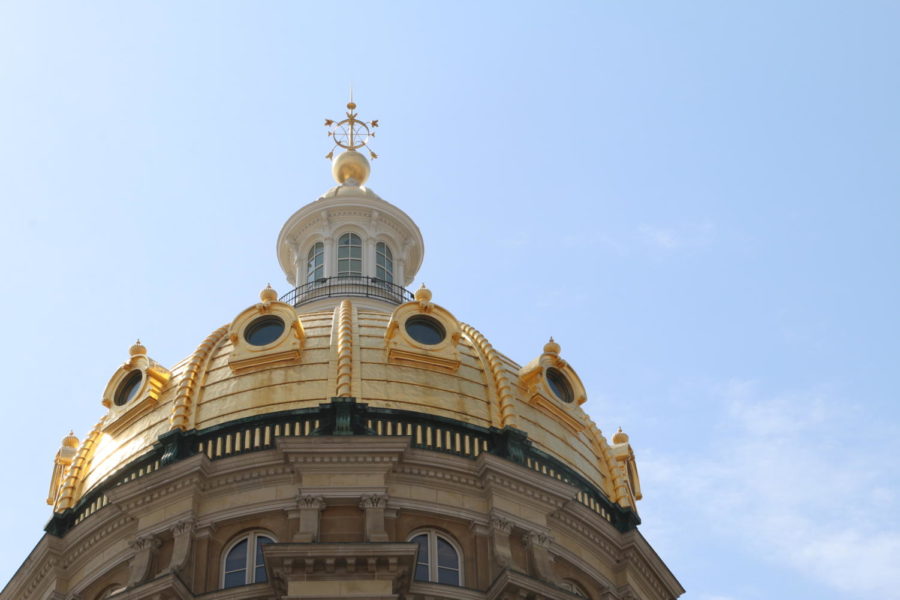- App Content
- App Content / News
- News
- News / Politics And Administration
- News / Politics And Administration / State
Iowa legislature will likely continue session without pay as budget plans finalize
Amber Gustafson is running for Iowa Senate District 19 which includes Ankeny, Saylorville and Alleman. The Iowa Senate meets in the Iowa State Capitol Building in Des Moines.
April 17, 2018
The Iowa Legislature was set to adjourn Tuesday, the 100th day of the session, but will likely continue on into the week following a myriad of unfinished business.
Legislators, who don’t get paid overtime, typically only extend the session by a few days. As these legislators stop getting the money to pay for motels, meals and travel — $126 a day for Polk County Legislators and $168 for the rest — they tend to speed up their work and get things done.
Without a budget plan in sight, this year’s session may go on for much longer than expected. By Iowa law, the Legislature cannot adjourn until a budget is decided on and that can’t happen until the governor, Senate and House come to an agreement on next year’s tax cuts.
Sen. Randy Feenstra, R-Hull, chair of the Senate Ways and Means Committee, said in regards to the tax cuts, “The Senate is looking to be here as long as it takes to make sure that Iowa taxpayers get what they deserve.”
The tax plans in both chambers are still far from a consensus. The House has proposed a plan to lower individual income taxes by $1.3 billion over the next five years while the Senate has proposed reducing state taxes on individuals and corporations by $2 billion.
Legislative Democrats are concerned with both plans, saying that either one would compromise public funded education and public safety measures. They warn it could lead to higher tuition costs at public universities, while lowering funding for K-12 education, public safety measures and health care.
Despite this opposition, it is almost certain that some form of tax cut will pass in the state before the end of this session.
The decision that the Legislature comes to will be crucial in setting next year’s budget numbers. The current general fund, which holds all discretionary spending for the state, amounts to about $7.2 billion.
Next year’s fund, however, is undecided until the tax debate concludes and only school funding, set at $3.2 billion for next year, has been approved.
The Legislature has also proposed cutting multiple areas to allow for steady spending and simultaneous tax cuts. One cut they are considering would end the state’s “backfill” payments to counties for property taxes.
This payment was a result of a 2013 decision by the Legislature to cut commercial property taxes and cover lost revenues. This would amount to savings of $152.1 million annually but put more pressure on county budgets.
Iowa’s constitution requires the state to have a balanced budget at all times which has made it difficult now, and in the past, to set a budget plan. This has been especially the case in recent years as lower than projected revenue predictions have led to mid-year budget cuts in the state.
It isn’t just budget items that are holding back the Legislature from convening; there are three other bills that are currently being decided on before the Legislature is set to adjourn.
Senate File 2281, which would ban abortions if a doctor can detect a fetal heartbeat, has passed the Senate.
The House passed its own version of the bill and the two are waiting to come to an agreement on certain provisions. Though this is high on the Republican agenda — every Senate and House Republican supports the bills — it did not pass before the end of session.
Additionally, House File 2377, which would help combat opioid addiction in the state, is yet to be passed by the Senate. The bill would create a limit on opioid prescriptions, implement “Good Samaritan laws” for people who report overdoses and requires opioid prescriptions be filed electronically to prevent forgeries on paper prescriptions.
The bill passed the House in February on a 98-0 vote and is supported by the governor and members of the Senate, but they are still finalizing the details before it passes.







